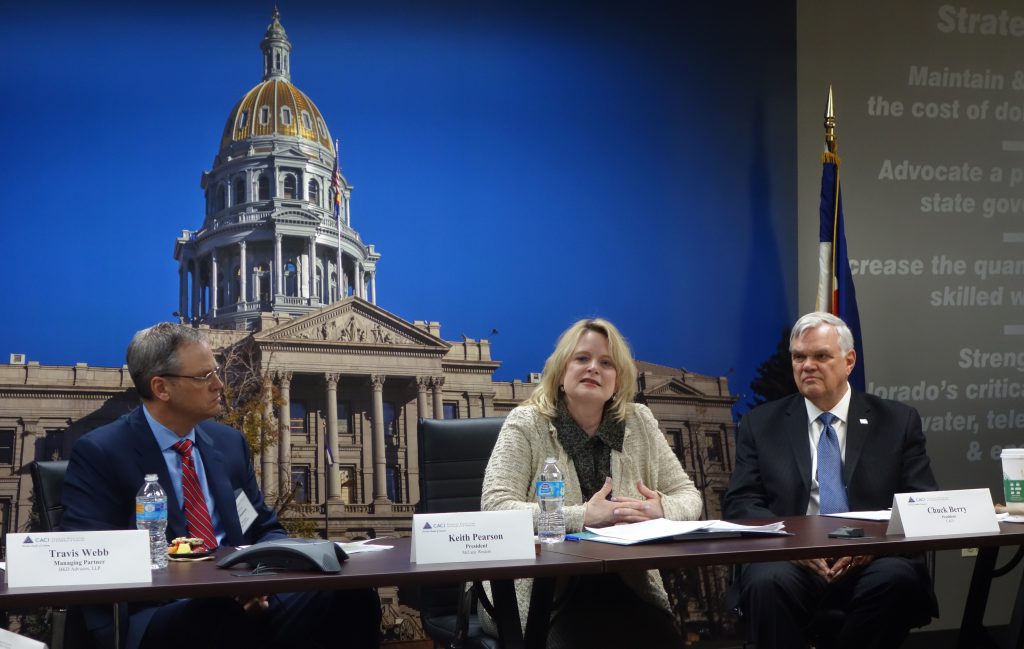In this Capitol Report:
- CACI Works on Pregnant Employees’ Accommodation Bill
- House Passes HB-1388, the “Ban-the-Box” Proposal, on Second Reading
- Colorado Attorney General Cynthia Coffman Discusses Business Issues at the CACI Board of Directors Meeting
- Gabby Reed, Policy Director for the House Minority Office, Addresses CACI's Governmental Affairs Council
- CACI-Member HCA HealthONE hosts CACI EXECs Advocacy Class
- U.S. DOT Floats Proposal for Tallying Project Carbon Emissions
- Don’t Miss CACI’s Federal Affairs Council! THIS Tuesday, April 26th
This Capitol Report is brought to you by:
CACI Works on Pregnant Employees’ Accommodation Bill
Yesterday afternoon, a House committee heard a bill that would grant certain accommodations to pregnant workers. CACI has been working for months with the Sponsor and the bill’s supporters to modify the proposal to address CACI’s concerns.
The introduced bill, HB-1438, is sponsored by Representative Faith Winter (D-Westminster). The House Health, Insurance and Environment Committee took testimony on the bill and discussed the proposal, but took no action. The bill has not yet been scheduled by the Committee for action.
The Senate sponsor is a Republican, Senator Beth Martinez Humenik (Thornton). The bill is expected to receive bi-partisan support in both chambers.
Here’s the summary of the introduced bill from the non-partisan fiscal note:
Summary of Legislation
This bill requires employers to engage in a timely, good-faith, interactive process to determine if an employee requires reasonable accommodations related to pregnancy or physical recovery from childbirth. Reasonable accommodations may include the provision of more frequent or longer break periods; more frequent bathroom, food, or water breaks; acquisition or modification of equipment or seating; limitations on lifting; temporary transfer to a less strenuous or hazardous position or light duty, if available; assistance with manual labor; or modified work schedules, as long as certain conditions are met. Employers must provide these accommodations to an applicant for employment or to an employee, if requested, unless the accommodations place an undue hardship on the employer’s business. “Undue hardship” is defined as an action requiring significant difficulty or expense to the employer and can include consideration of the following factors:
- the nature and cost of the accommodations;
- the overall financial resources of the employer or overall size of the business; and
- the accommodation’s effect on expenses, resources, or
In response to a request or need for reasonable accommodations related to pregnancy or childbirth, an employer may not:
- take adverse actions against an employee;
- deny employment opportunities to an applicant or employee;
- require an applicant or employee to accept an accommodation that the applicant or employee chooses not to accept; or
- require an employee to take leave if the employer can provide another reasonable accommodation.
Employers must provide written notice of the right to be free from discriminatory or unfair employment practices related to these requirements to new employees and existing employees within 120 days of the bill’s effective date, and they must post the notice in a conspicuous place. With the exception of posting the notice, any violation of these requirements constitutes a discriminatory or unfair employment practice.
Background
“Employer” is defined in statute as the state of Colorado or any political subdivision, commission, department, institution, or school district thereof; and every other person employing persons within in the state. It does not include religious organizations or associations, except those supported in whole or in part by money raised by taxation or public borrowing.
The Colorado Civil Rights Division (CCRD) in the Department of Regulatory Agencies (DORA) investigates complaints of employment discrimination. Over the last three years, the CCRD has received an average of 32 complaints per year of employment discrimination related to pregnancy or childbirth. The CCRD currently refers to federal law, the Pregnancy Discrimination Act, when enforcing the Colorado Anti-Discrimination Act in these matters.
Brooke Colaizzi, Member with CACI-member Sherman & Howard, and Loren Furman, CACI Senior Vice President, State and Federal Relations, testified on the bill on behalf of the CACI Labor and Employment Council.
Here is an edited version of Loren’s prepared testimony:
First let me thank the Sponsor for the time and effort that she has spent in working with business groups on this bill. Since December of last year, we’ve been trying to find a balance between employers who need workers to fulfill the essential functions of the job and employees who are pregnant.
Employers, to whom we have talked , want to help the employee so that they can maintain their working relationship beyond the pregnancy.
Brooke and other attorneys, who participate in our CACI Labor and Employment Council and who have years of expertise in this practice area, have spent hours in the stakeholder process with the Sponsor.
Representative Winter has agreed to all of the changes we have requested to the bill but there continues to be one remaining issue at stake that she is working hard to resolve.
During the 2013 legislative session, HB-1136 was adopted that expanded the legal remedies under the Colorado Anti-Discrimination Act for someone who seeks to sue for a discrimination claim. The expansion of this law has created great consternation among employers who may spend thousands of dollars defending or settling a claim even if they were not found at fault.
Ultimately, we hope that this one issue can be resolved so that the legislature can pass a bill pass that not only helps pregnant women on the job but does is not jeopardize employers.
Since this language is still pending negotiations among the lawyers, we thought it would be helpful to at least have Brooke here who practices in this area and who can answer the questions by Committee Members.
Here is Brooke’s prepared testimony:
My name is Brooke Colaizzi. I am a management-side employment attorney with Sherman & Howard. I am here today on behalf of the Colorado Association of Commerce and Industry. Over my 13-year career, I have counseled and litigated on behalf of many employers facing issues related to pregnancy and gender discrimination and disability accommodation and discrimination, issues germane to the subject matter of this bill.
As Ms. Furman noted, I had the opportunity and privilege to participate in two meetings about the purpose and substance of this bill. I appreciate the cooperation and compromise that all participants demonstrated throughout the process.
These circumstances are difficult ones for employers. I can say without exception that all of the employers that I have had the privilege of working over the last 13 years value their employees and are very cognizant of and sympathetic to the fact that pregnancy, as wonderful as it can be, also can take an enormous physical and emotional toll on an employee. At the same time, employers need employees present in the workplace and performing their duties. No matter how much employers want to support their employees, employers, especially smaller employers, do not have the luxury of conducting business for months at a time with a workforce that is less than full-strength. Thus, a fair balance and careful consideration of employer and employee interests is critical.
During our meetings, we worked very hard to bring this bill in line with a legal framework with which most employers are intimately familiar: the reasonable accommodation/interactive process applied to disability accommodations. The focus and goal of that framework is to enable the disabled employee to continue to perform the functions of her job, thus remaining employed—as the goal of this bill is to allow pregnant employees to remain employed during pregnancy. Thus, the disability accommodation framework is appropriately adopted in the pregnancy context. Furthermore, employers’ familiarity with the framework will ease implementation of this new accommodation obligation.
I am more than happy to answer any questions that you may have for me. Thank you for your time.
To address CACI’s concerns, detailed above by Brooke and Loren, Representative Winter has prepared an amendment to the bill when the Committee takes up the measure for action.
For more information about HB-1438, contact Loren Furman, CACI Senior Vice President, State and Federal Relations, at 303.866.9642.
For news media coverage of this bill, read:
“Pregnant workers rights bill touted by Colorado lawmakers, activists,” by Jesse Paul, The Denver Post, April 20th.
House Passes HB-1388, the “Ban-the-Box” Proposal, on Second Reading
This morning, the Democrat-controlled House on a Second Reading voice vote approved HB-1388, the “ban the box” bill, which the House Appropriations earlier in the morning had endorsed.
The bill next faces a recorded, Third Reading vote by the House, perhaps on Monday, which will send the controversial bill to the Republican-controlled Senate, where the bill faces a problematic future.
The bill’s summary states;
“This bill prohibits an employer, excluding the state and its political subdivisions, from advertising or including language in an employment application that indicates that a person with a criminal history may not apply for a position. An employer may not make an inquiry about a candidate’s arrest history or criminal convictions until it selects a candidate for an interview or extends an offer of employment to that person.”
During the House Floor debate, numerous Democrats spoke in support of the bill and numerous Republicans spoke against it. Earlier this morning, the bill was approved by the House Appropriations Committee.
For more on this CACI-opposed bill, read:
“House Committee OKs ‘Ban-the-Box’ Bill,” CACI Colorado Capitol Report, April 15th.
Colorado Attorney General Cynthia Coffman Discusses Business Issues at the CACI Board of Directors Meeting
At the CACI Board of Directors meeting yesterday, Colorado Attorney General Cynthia Coffman discussed a number of business issues in which her office is involved. Pictured, left, is Keith Pearson, CACI Chair-Elect and President, McLane Western; Attorney General Coffman; and CACI President Chuck Berry. Attorney General Coffman addressed such topics as the EPA’s “Federal Clean Power Plan,” the BLM’s proposed rules on fracking and the EPA’s “Waters of the U.S.” proposal.
Gabby Reed, Policy Director for the House Minority Office, Addresses CACI's Governmental Affairs Council
At Tuesday’s luncheon of the CACI Governmental Affairs Council, the members heard from Gabby Reed, Policy Director for the House Minority Office, center. Left is Dan O’Connell, CACI Governmental Relations Representative; right is Loren Furman, CACI Senior Vice President, State and Federal Relations. Gabby discussed her caucus’ relations with the other three caucuses and major issues facing the two chambers as the legislature heads into the home stretch.
CACI-Member HCA HealthONE hosts CACI EXECs Advocacy Class
On Wednesday, the CACI EXECs Advocacy Class toured Presbyterian/St. Luke’s Medical Center and Rocky Mountain Hospital for Children.
HCA HealthONE executives discussed with the class the health-care environment and the role of hospitals. The class learned about telemedicine and how this new technology will affect the future of medicine and patient care.
Lastly, the class members were presented with an opportunity to “bunny-suit up” and enter the operating room to try their hand at operating the da Vinci robot used for surgeries.
To see more photographs, visit the CACI Facebook page.
For more information on EXECs, contact Lalitha Christian, Manager, CACI Membership Programs and Communication, at 303.866.9635.
Federal Policy News
U.S. DOT Floats Proposal for Tallying Project Carbon Emissions
On Monday, the U.S. Federal Highway Administration (FHWA), within the U.S. Department of Transportation (DOT), announced it is considering new requirements for states and regional organizations receiving federal funding. The proposal was formally “noticed” today in the Federal Register.
The 423-page notice of proposed rule-making would require the above groups to measure and project how much their planned projects would contribute to carbon pollution. The DOT/FHWA argues the move is meant to standardize how states/regions measure “success” for federally funded projects along 12 measurements, thereby allowing FHWA to assess “annual hours of excessive delays per capita on roadways.”
According to the NPRM, “Without such reporting it is difficult for FHWA to look at the effectiveness of the highway aid program as a means to address surface transportation performance.”
The proposed rule would also:
- Require states to measure how a project changes congestion,
- Track freight movement improvements,
- Report how and whether pavement conditions change, and
- Report fatalities and injuries associated with a project/project area.
The Congestion Mitigation and Air Quality Improvement Program (CMAQ) would oversee the FHWA in helping reduce and meet regional national ambient air quality standards (NAAQS). Although some states already participate in similar reporting, this is the first proposal to make such reporting mandatory.
Environmental activists have been very quick to support the proposed rule. The Natural Resources Defense Council applauded the FHWA’s efforts saying:
“Expecting planners to think about air quality and health goes to the heart of what it means to plan, so this is a promising first step. If the final rule makes this a requirement, it could improve quality of life and help slow, stop and reverse climate change.”
NRDC Senior Policy Adviser Deron Lovaas
CACI members with questions on this issue or other Federal issues should contact CACI Federal Policy Director Leah Curtsinger at 303.866.9641.
Don’t Miss CACI’s Federal Affairs Council! THIS Tuesday, April 26th
Transportation & Infrastructure Investment in Colorado”
Guest Speakers are:
- Shailen Bhatt, C-DOT Executive Director
- John Cater, Regional Director for U.S. DOT’s Federal Highway Administration
Our speakers will talk about:
– Upcoming priority projects for Colorado
– How to get businesses more involved in state planning opportunities
– Resources for federal & state contracts
– Opportunities for P3s
– Plus, how Colorado’s ozone compliance may affect transportation in the future
We’ll round out the agenda with:
– Senate FAA Reauthorization & Energy bill update
– Walk-through of remaining Congressional calendar




